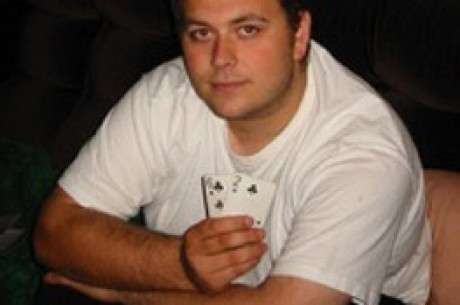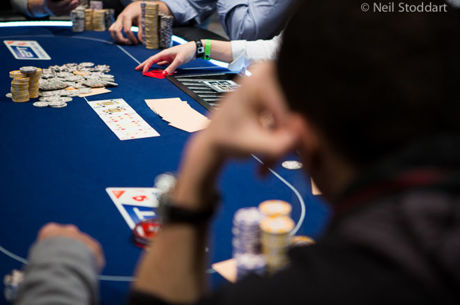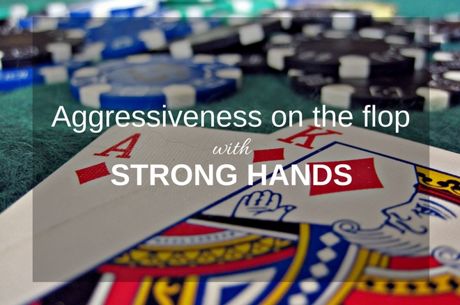Mistakes in reading your opponent part 1: execution

Most players accept that, to be a very good poker player, you need to be able to put your opponent on a hand. Interestingly, many losing poker players have the ability to generally put most of their opponents on a hand. Sadly, they remain losing players because they are not able to "execute" based on their read. They know what the correct move is, but fail to do so.
I remember one pot where I had barely played a hand for an hour. By the way, this was an appropriate strategy because in that hour, I was dealt nothing but K-4, 9-3, 4-7, Q-2....get the picture? Then out of nowhere, I was dealt pocket aces. A player next to me raised. I then reraised and he called. The flop was 9-6-2. He bet and I raised. He called that and then called the whole way. As it turns out, he had A-9 suited. It's always a pleasure to collect calls from an opponent who only has two outs.
After the showdown, he said: "I knew you had either aces or kings." I'm sure you've all heard someone say something similar to you when you showdown the winning hand "I knew you had a flush....I knew you had three 7s....I knew you had a straight...." What amazes me about these players is that they seem to be able to put their opponents on a hand - sometimes perfectly. However, they simply don't act on their reads. They have no execution.
An even strange example is this one. I once had K-K and played it very obviously (raised preflop and bet the whole way). An opponent flop a backdoor flush draw and made it on the river. I came out betting on the river and he called. When I turned over my hand on the river, guess what he said: "I thought you probably had kings or aces." If this opponent read me so perfectly, why didn't he raise the river?
There are three common mistakes that you can make (amongst many others) with respect to execution based on your reads. These mistakes are, more or less, motivations for acting in manner contrary the read of your opponents' hands. If you had 7-8 and the flop was A-8-5, you will probably fold if the action gets heavy. Sometimes, even when the action is heavy, you will end up folding the best hand. But there is nothing wrong with that. Sometimes you have to fold in such situations, simply because it is too difficult to call. Where the following mistakes commonly occur is when you have a good, but losing hand. In these situations, most players find some excuse to call. These excuses or motivations are discussed below. I classify them as 'mistakes.'
COMMON MISTAKE #1: CALLING TO PROVE YOU WERE RIGHT
You have A-10 and raise preflop. A tight player then reraises you from the big blind. You call. The flop is A-7-2. The tight player bets and you raise. The tight player then reraises. What does he have? Most good and bad players with a fair bit of playing experience will probably say that the tight player has either AK or a set. I'd say that's correct. So what's the move now? Well it would appear that you have 3 outs and you are not getting sufficient pot odds to call. Therefore, you should fold.
This is the correct "execution" of your read. However, most players will call the turn and call the river knowing that they are going to lose. They simply want to call so that they can satisfy themselves that they read the tight player's hand correctly. This is ridiculous. What is the point of putting your opponent on a hand if you do not act on your read?
COMMON MISTAKE #2: SILLY CHANGE OF MIND
This is a real trap that you actually have to train yourself out of. Let's say you have A-9 and the flop is A-J-8. A solid player bets and you call. You are not certain of his hand, but you suspect that you may be beat. However, if he checks the turn, you may well be in front. On the turn, a 7 falls and he bets again. You would ordinarily have folded, you have picked up an inside straight draw and 9 (two pair) would probably win it. You call.
On the river, a 4 falls and he bets. You know you are beat, but then you change your mind about his hand. Maybe he had been betting K-J the whole way? Or maybe he had K-K and is hoping you don't have an ace? All of sudden you start putting him all these possible hands that you could beat. Not only are you imaging up all these possible hands that you can beat, you start convincing yourself that he holds one of these hands. In reality, the only hand you can beat is A-6 or worse if a solid player is betting into you. In these situations, "your first instinct is usually correct!" Don't start imaging up hands that you can beat and then start designating these hands to your opponent.
COMMON MISTAKE #3: SHOW EVERYONE THE HAND YOU LOST ON
This is really common. You have AK. The flop is A-K-10. Sweet! You bet and three people call. The turn is a Jack. You bet and are raise and reraised. So many people will call both the turn and the river in this situation and I know why. They know that their opponents both have a queen in the hole. However, they want to get to the showdown, no matter how much it costs, because they want to roll over their cards on the river and gain sympathy from the table: "I have AK and flopped two pair. Look at what I lost with." I have no sympathy though, because they knew they were paying off a better hand. They simply threw away money to show everyone their bad fortune. It's strange how people are prepared to lose money to show everyone that they lost with a strong hand
I watched a really strange example of this unfold one night. Player X had A-A and his opponent, Y, had 4-4. The flop was 4-3-3. A raising war ensued on the flop. The turn was another 3. X bet and Y raised. X now decided to put on the handbrake and simple call. The river was the forth 3. X bet (with the nuts) and then Y threw in a call with disgust. If you look carefully, you'll notice that Y would only split the pot if X had precisely 2-4. Since X raised preflop and got into a raising war on the flop, there is virtually no chance that X had 2-4. Any other possible hand that X has will beat Y's hand. Even if X had 5-2, he would win the pot. So there is only one possible reason for Y to call the river: because he had to show the table how he lost after flopping a full house.








